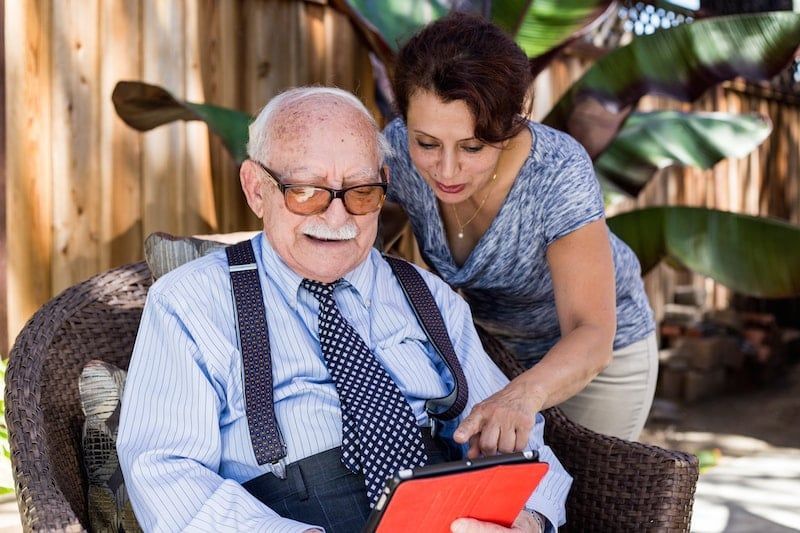How to Support Parents in Assisted Living
Learn how to support parents in assisted living with tips from Seniorly. Help your parents to settle into a new community and feel both at-home and connected.

Moving is considered one of the top life-stressors known to trigger anxiety and sadness, and a big move can be even more difficult for seniors — but it doesn't have to be that way. Assisted living satisfaction rates are very high and the help of a loved one is sure to smooth out any bumps that a senior might experience during a significant transition. Use the following tips to support your senior parent as they make this move to assisted living.
Take time to visit and talk often
In the weeks after the big move to assisted living, don’t just disappear. Take time to visit your loved one and visit often. Having people they love around is one of the best ways to make the transition easier. Visiting also gives you the chance to see how they’re doing and allows you to make sure the community is keeping all its promises and commitments to your loved one. Be honest about how often you can visit and then keep your promises to prevent your loved one from feeling anxious. When you can’t visit, make sure you’re staying in touch with phone calls, text, or other methods of communication.
Try Facetime or Zoom for more face-to-face interaction
Sometimes it’s tough to find time to visit as often as you want, particularly if your loved one is in an assisted living community that’s far away. However, as we’ve seen throughout the course of the pandemic, there are great ways you can still get face-to-face time. If your parent is fairly familiar with technology, using Facetime, Zoom, or other video chat platforms on their phone, tablet, or computer can help you stay in touch, offer support, and check in to see how things are going. It’s also a great way for grandkids and other family members that live far away to connect face-to-face as well.
Encourage parents to socialize within the community
Encourage your parents to socialize within their new community as much as possible: they could find some great friends in their new home. Assisted living properties host different activities regularly to keep residents active and help them build friendships. Or your parent can create an activity of their own. For example, one great idea is for seniors to create a podcast group where they can listen to podcasts together and then have thoughtful discussions on the topics.
Acknowledge their fears and concerns
Take the time to acknowledge your loved one’s fears and concerns. It’s tempting to just paint their new move in a completely positive light and ignore their fears completely, but if your parents have concerns about moving, they need to feel heard. Listen to and acknowledge what they’re feeling and then help them to work through these feelings. Check in with your parents from time to time to see if their fears and concerns have been resolved or if they continue to have these feelings. If their feelings aren’t improving over time, work with on-site staff and your parents to come up with a plan to address any problems.
Keep parents surrounded with personal belongings
Although moving from their home to an assisted living community may involve downsizing, we recommend keeping your parents surrounded with at least some personal belongings. While large pieces of furniture may not fit in their new place, important belongings like artwork, photo albums, favorite books, and familiar bedding can be added to their new home. Having familiar objects around can help them through the transition and make their new accommodations feel like home.
Support parents having an active life outside of the community
Although the AARP reports that the average age of assisted living residents is 85, most assisted living residents are still fairly active, so make sure you support your parents engaging in activities outside of their new community as well as in it. You don’t want your parent to feel like their life is now confined to their new assisted living community. They still have hobbies and friends outside, so encourage them to get out and about, perhaps with walks at local parks or maybe one of the larger national parks nearby. Many assisted living communities will provide transport and planned visits to local attractions, restaurants, or continuing education classes.
Give them plenty of independence and avoid over-helping
While there’s a lot you can do to help your parent move and adjust to their new assisted living community, it’s still important to give them plenty of independence and avoid over-helping. According to The Atlantic, while parents appreciate the help, sometimes children can overdo it and make them feel like they aren’t competent, especially if they are moving to an assisted living nearby. Let your parents know you’re there to assist them if they need it, but work on helping them feel strong and capable of dealing with these new changes. Be sure to involve your loved one in discussions about their care and avoid making decisions for them (unless, of course, dementia or other conditions prevent this).
Although it may take your parent some time to adjust to living in their new senior housing, many seniors report feeling happy with their choice to move into a community. They often feel less isolated, and the worries of maintaining a home, running errands, and other chores are alleviated by moving to a place where these things are handled efficiently by caring staff.
Arthur Bretschneider is CEO and Co-Founder of Seniorly. As a third generation leader in the senior living industry, Arthur brings both deep compassion and a wealth of practical experience to his work at Seniorly. Arthur holds an MBA from Haas School of Business and has been featured in the New York Times and Forbes Magazine as a thought leader in the senior living space. Arthur is a passionate and vocal advocate for improving the lives of older adults through community, and believes strongly that structured senior living environments can positively impact the aging experience.
To learn more about Seniorly's editorial guidelines, click here.
Sign up for our Healthy Aging Handbook
Seniorly’s Senior Living experts created a comprehensive handbook to help people age happily while ensuring they love where they live. Enter your email address below to receive your copy and learn more about Healthy Aging and Senior Living.*
*By submitting your email address above, you consent to receive occasional email communications from Seniorly, including educational content and tips, newsletters, and other relevant updates and offerings. You can unsubscribe at any time and we will never sell or distribute your email address to a third party. You can view our Privacy Policy here.
